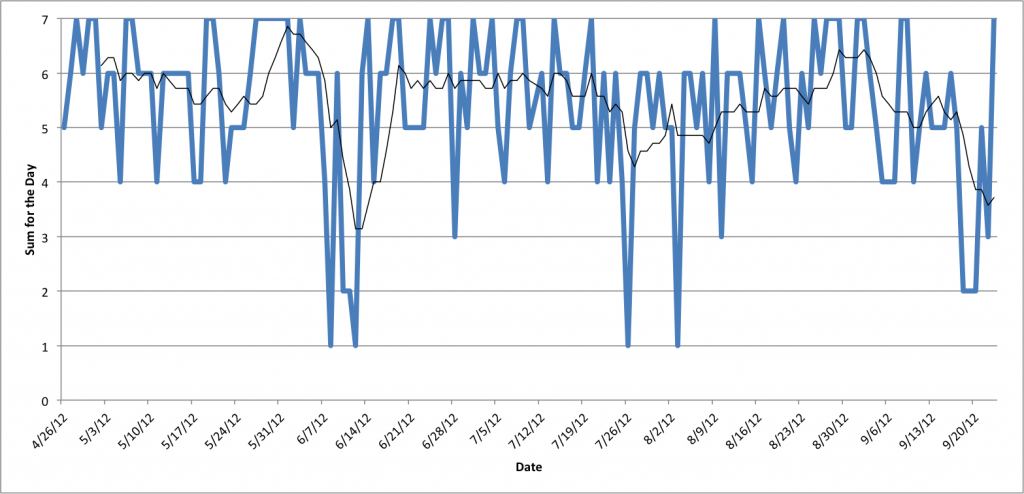
My daily sums (between 0 and 7) for my Happiness project dailies, as well as a 7-day trend line. Click for bigger image.
I recently ran into a coworker who keeps a blog with all of his data collected over a period of one year (Chris Volinsky and his “My Year of Data” blog). This is part of a larger movement of Quantified Self — which is about gaining self-knowledge by measuring various aspects of one’s life. I wanted to share my own data from a self-tracking project that I’ve been doing for the past 5 months (ever since my defense). I’ve been doing this kind of mindlessly for awhile so I’m using this blog entry as an opportunity to reflect.
I’ve been tracking myself as I do a variation of the Happiness Project, which is a book/blog that suggests for one to explicitly identify the aspects of life that are important to happiness and track them daily. After trying to do a few things each month, as suggested in the book, I switched to a more holistic approach. So, I track 7 daily items and 5 weekly items that I think are big components of being happy for me. Six of the 7 daily items (one removed for privacy) include: exercise, meditation, sleep, work, social relationships, and planning/reflecting on my day. The 5 weekly items are volunteering my time, exploring something new, reading for fun, dealing with a pesky task, and writing or drawing in this blog. I make all of this data for the past 5 months available as an Excel Data Spreadsheet.
Here are the few bits of insight that I got from this exercise:
- One of my goals was to prevent “screw it” days where something went wrong so I didn’t do anything. Well, that kind of worked, I had no days with the score of 0 and only four days with the score of 1.
- Even major life events such as turning in my final thesis, graduating, spending almost an entire month traveling for back-to-back job interviews, and moving from GA to NJ don’t slow me down as much as videogames. All the major dips were times when I started a new videogame. Is this enough to stop me? Not before Pokemon White 2!
- Tracking alone is not enough (my overall trend is currently negative). I need to actually set goals. Late-May, early-June, I was on the quest for the “perfect week” and it shows in the data. Later on I tracked, but just tried to “do my best” and that wasn’t as successful.
I really just plopped my data in Excel, which limited my insights, but here is what I would like to be able to do easily with this kind of data (*cough* make this for me, please *cough*):
- See how different tracked values interrelate and how each behavior affects the overall score. For example, is getting sleep very highly correlated with an overall high score? Or is it that if I sleep a lot, I don’t have time for anything else?
- Understanding why and where I struggle. What goals are most challenging? What days of the week are most challenging? Who are the people in my life who motivate me the most for each behavior (I don’t have contact tracked, but it would be doable to mine my calendar and phone to understand who I talked to that day)?
- Suggestions for achievable goals or games that I can do to keep myself motivated. For example, I had the idea of “perfect week,” but maybe there could be more focused games to keep things interesting. How about “healthy 10,” 10 days where I focus on sleep and exercise? Or “month of meditation,” where I try to do that every day for a month. Just something that will give me a bit of variety and something to focus on. Gamification really works for me, so I want something customizable where I can get help setting up goals and badges and such.
Is anybody else out there tracking something interesting? How are you analyzing this data to get insights?
